|
|
|
Sort Order |
|
|
|
Items / Page
|
|
|
|
|
|
|
| Srl | Item |
| 1 |
ID:
191014
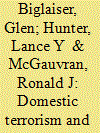

|
|
|
|
|
| Summary/Abstract |
Since the 1990s, credit rating agencies have played a prominent financial role in developing countries, rating their sovereign bonds and determining capital costs. Over much the same years, domestic terrorism has expanded, increasing market disruptions in countries. Despite the heightened costs related to rebel attacks, few studies investigate the impact of domestic terrorism on bond ratings. Using a sample of seventy-one developing countries between 1996 and 2018, we find that domestic terrorist incidents result in sovereign bond downgrades for countries that receive ratings. Further, when we disaggregate terrorist events by target type, we observe that attacks directed at the government, military and police, business, non-governmental organizations, and private citizens/property have a larger effect than other terrorist incidents. We argue that specific domestic terrorist attacks increase economic instability, leading to capital flight, and a shifting of resources from productive economic sectors to counterterrorism. The resulting economic changes weaken a country’s economy and increase debt nonpayment risk.
|
|
|
|
|
|
|
|
|
|
|
|
|
|
|
|
| 2 |
ID:
106252
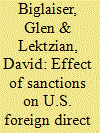

|
|
|
|
|
| Publication |
2011.
|
| Summary/Abstract |
For years, the United States has imposed economic sanctions to compel countries to alter their behavior. An important concern is whether government sanctions influence private foreign direct investment (FDI) decisions, the largest source of foreign capital. In the first study to assess empirically the relationship between economic sanctions and FDI, we consider whether U.S. sanctions influence U.S. FDI inflows into targeted countries. Using panel data for 171 countries from 1965 to 2000, we find strong evidence that U.S investors pull out of countries targeted for U.S sanctions prior to their imposition. This disinvestment is not permanent and investment tends to return after the sanctions are imposed. The results provide support for FDI studies that show the effect of risk on investor decision making.
|
|
|
|
|
|
|
|
|
|
|
|
|
|
|
|
| 3 |
ID:
053512
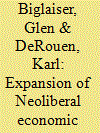

|
|
|
| 4 |
ID:
114190
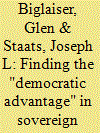

|
|
|
|
|
| Publication |
2012.
|
| Summary/Abstract |
Much scholarship in the political economy literature has investigated the influence of the democratic advantage on sovereign bond ratings by credit rating agencies (CRAs). Missing from earlier work, however, is inquiry into the effects on bond ratings of factors that lower political risk, such as adherence to the rule of law, the presence of a strong and independent judicial system, and protection of property rights. Using panel data for up to thirty-six developing countries from 1996 to 2006, we find that rule of law, strong and independent courts, and protection of property rights have significant positive effects on bond ratings. Policymakers wanting to obtain higher bond ratings and increased revenue from bond sales would do well to heed the message contained in these findings.
|
|
|
|
|
|
|
|
|
|
|
|
|
|
|
|
| 5 |
ID:
079949


|
|
|
|
|
| Publication |
2007.
|
| Summary/Abstract |
In contrast to the 19th and early 20th centuries, the effects of security factors on foreign direct investment (FDI) have received limited interest in the post-Cold War era. Using panel data for 126 developing countries between 1966 and 2002, and controlling for macroeconomic conditions, economic reforms, and level of democratization, this essay tests the effects of "follow the flag" variables on U.S. FDI. Security factors can affect FDI in two stages: the initial decision over whether to invest and the second stage, which involves the amount invested. Our results indicate a selection effect and that follow the flag factors are influential both in the selection phase and in the main equation for U.S. investors. However, such results are not found for global investors, suggesting that positive links between economic and security goals only hold for U.S. firms
|
|
|
|
|
|
|
|
|
|
|
|
|
|
|
|
| 6 |
ID:
111749
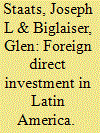

|
|
|
|
|
| Publication |
2012.
|
| Summary/Abstract |
An extensive literature has emerged recently that investigates the determinants of foreign direct investment (FDI) in developing regions of the world, including Latin America. Much of this work has focused on whether authoritarian or democratic rule is better for attracting FDI. Curiously, little attention has been devoted to unpacking regime type to see whether specific political institutional variables related to judicial strength and adherence to the rule of law are important FDI determinants. Based on panel data analysis and our own survey of US corporations, we find that judicial strength and rule of law elements are important determinants of FDI in Latin America.
|
|
|
|
|
|
|
|
|
|
|
|
|
|
|
|
| 7 |
ID:
089324


|
|
|
|
|
| Publication |
2009.
|
| Summary/Abstract |
The relationship between political conflict and trade has contributed to a riveting discussion in international relations about whether trade produces conflict, or whether conflict itself reduces trade. Most studies proxy "the flag" using militarized interstate disputes (MIDs). However, extensions of "the flag" might well obtain in environments short of MIDs. A more general way to proxy the flag is troop deployments. The deployment of military troops is an essential element of foreign policy. Using panel data for 126 developing countries from 1965 to 2002 and a two-stage least square approach, this essay investigates the relationship between trade and United States troop deployments. We find that trade and troops have a nonrecursive relationship: trade follows the flag and troops follow trade. Given the increased insecurity in the world today, the results are timely and reinforce previous research about the reciprocal relationship between the flag and trade.
|
|
|
|
|
|
|
|
|
|
|
|
|
|
|
|
| 8 |
ID:
119640


|
|
|
|
|
| Publication |
2013.
|
| Summary/Abstract |
Complementing the effectiveness of US sanctions debate, the US government often prods US investors to disinvest from targeted countries, hoping to pressure sanctioned countries to back US foreign policy goals or face economic costs for their actions. Missing from the effectiveness of sanctions debate is the impact US sanctions have on third-party foreign direct investment (FDI). Using panel data for 171 countries from 1969 to 2000, we present the first empirical study on the effect of sanctions on global FDI. We find strong evidence that when US firms disinvest during US sanctions, global FDI significantly increases, providing the target country with a reliable source of capital replacement. The results suggest the limited effectiveness of sanctions for restricting capital flows to targeted countries and that US firms may ultimately bear the highest costs from US-imposed sanctions.
|
|
|
|
|
|
|
|
|
|
|
|
|
|
|
|
| 9 |
ID:
136617


|
|
|
|
|
| Summary/Abstract |
The United States has made repeated public commitments to provide humanitarian aid based on need alone. However, some scholars suggest that US self-interest is a stronger predictor of US humanitarian assistance than need. We examine the tension between self-interest and need by studying the allocations made by the US Agency for International Development's Office of US Foreign Disaster Assistance for more than 100 developing countries between 1989 and 2009. Moving beyond previous studies, we measure need based on both natural (floods, earthquakes, hurricanes) and man-made (conflict related) disasters. Contrary to much previous scholarship, we find need factors shape the decision to provide aid more than US self-interest does. We also find important differences in how much humanitarian assistance is distributed in the pre- and post-9/11 eras, with foreign policy affinity to the United States and battle deaths playing useful roles in how much aid a country receives in the post-9/11 period. The findings generally point to the ongoing importance of need as a driver of humanitarian aid decisions.
|
|
|
|
|
|
|
|
|
|
|
|
|
|
|
|
| 10 |
ID:
135899
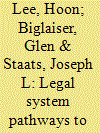

|
|
|
|
|
| Summary/Abstract |
Building on recent works showing the role that legal institutions can play in attracting foreign capital (Jensen 2003, 2006; Li and Resnick 2003; Li 2006; Biglaiser and Staats 2010; Staats and Biglaiser 2012), and drawing on insights obtained from Powell and Rickard (2010), we use panel data for 114 developing countries from 1970 to 2007 to demonstrate that developing countries with common law legal systems attract greater foreign direct investment (FDI) than countries that have civil law or Islamic legal systems because common law systems are more inclined to promote the rule of law and protect property rights and can be understood to provide more efficiency in the law, better contract enforcement, more judicial autonomy, and more market-oriented regulations.
|
|
|
|
|
|
|
|
|
|
|
|
|
|
|
|
| 11 |
ID:
179274
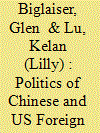

|
|
|
|
|
| Summary/Abstract |
In the foreign direct investment (FDI) literature, studies show that investors prefer low-risk host states. However, the research focuses on investors from developed country democracies, such as the United States, ignoring the rise of China, an authoritarian developing country that engages in public and private investment. This paper investigates Chinese state and private FDI in 127 developing countries from 2003 to 2017 to determine the effects of political risk on FDI. We find that, as with US FDI, low-risk developing countries attract more Chinese state FDI, except in the case of natural resource investment, where Chinese investors appear to disregard risk concerns. For Chinese private FDI, on the other hand, political institutions seem to play no significant role, but political affiliations matter. Our work suggests that similarities between US and Chinese state FDI are increasing, while the investment strategies of Chinese private and state firms appear to be growing farther apart.
|
|
|
|
|
|
|
|
|
|
|
|
|
|
|
|
| 12 |
ID:
173983
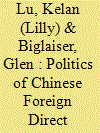

|
|
|
|
|
| Summary/Abstract |
Although recently Chinese investment in the USA has grown exponentially, it has not flowed equally among the US states. Controlling for popular explanations in the foreign direct investment literature, we carry out subnational analysis to assess the determinants of Chinese investment in the USA. Using a panel dataset for all states from 2006 to 2016, we find that Chinese firms are more attracted to states where Republican governors hold office. Republican-governed states particularly attract greenfield investments from Chinese firms. However, we also find that US national security concerns and Chinese goals appear to affect investment flows in high-technology states, limiting the role of partisanship. Our results indicate that it is too soon to dismiss the importance of politics on foreign direct investment.
|
|
|
|
|
|
|
|
|
|
|
|
|
|
|
|
| 13 |
ID:
103534


|
|
|
|
|
| Publication |
2011.
|
| Summary/Abstract |
The Financial Crisis in the late 1990s and the ongoing crisis have showed the importance of creating an early warning system (EWS) to lessen economic, political, and foreign policy fallout. Surprisingly, the EWS literature rarely considers the role of political institutions to detect economic dangers that can be harbingers of conflict. Controlling for common explanations in the literature, we use panel data for fifty developing countries from 1987 to 2004 to investigate the effect of political determinants for predicting economic crises. Although most political variables appear to have little influence in forecasting defaults or currency crises, models specified with bond ratings from the credit rating agencies can be helpful for predicting the onset of crisis. Our research is a first step toward gaining insights into how best to anticipate crisis that may prove beneficial particularly in light of the current global crisis.
|
|
|
|
|
|
|
|
|
|
|
|
|
|
|
|
| 14 |
ID:
076509
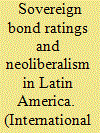

|
|
|
|
|
| Publication |
2007.
|
| Summary/Abstract |
The importance of credit rating agencies (CRAs) in rating sovereign bonds has grown as developing countries increasingly issue bonds to attract foreign capital. Although in their methodologies CRAs claim that the initiation of neoliberal reforms influences bond ratings, given the secrecy surrounding ratings, it is unclear what impact reforms actually have on CRAs. Controlling for macroeconomic and political determinants, we use statistical analyses, as well as recent qualitative evidence, for some 16 Latin American countries from 1992 to 2003 to assess the effects of economic reforms on CRA decisions. We find that among neoliberal policies only trade liberalization positively and consistently impacts bond ratings. The relative ease of implementation along with the credible commitment to maintain trade policies help explain higher bond ratings. The results also show that inflation and bond defaults negatively affect CRA assessments. The findings provide reasons for optimism. Many economic policies, often politically difficult to implement, do not lead to higher ratings. Others that are relatively easy to implement do. Policy makers in Latin American countries have more options to lessen political tensions, lower the cost of capital, and increase its availability for investment and growth than previously predicted.
|
|
|
|
|
|
|
|
|
|
|
|
|
|
|
|
| 15 |
ID:
077455


|
|
|
|
|
| Publication |
2007.
|
| Summary/Abstract |
The importance of sovereign bond ratings has grown recently as assessments by credit rating agencies (CRAs) influence the cost of capital. Understanding how CRAs determine country ratings is difficult based on the secretive nature of these agencies. Controlling for the common explanations in the literature, we use panel data and interviews to investigate the role of the "democratic advantage" and other determinants on bond ratings set by Moody's Investor Services, Standard and Poor's, and Fitch Ratings for fifty developing countries from 1987 to 2003. We find that regime type and most other political factors have little effect on bond raters. Instead, trade, inflation, growth, and bond default strongly affect sovereign ratings. The message for policymakers in developing countries is that factors that support bond repayment are most useful for enhancing CRA ratings
|
|
|
|
|
|
|
|
|
|
|
|
|
|
|
|
|
|
|
|
|